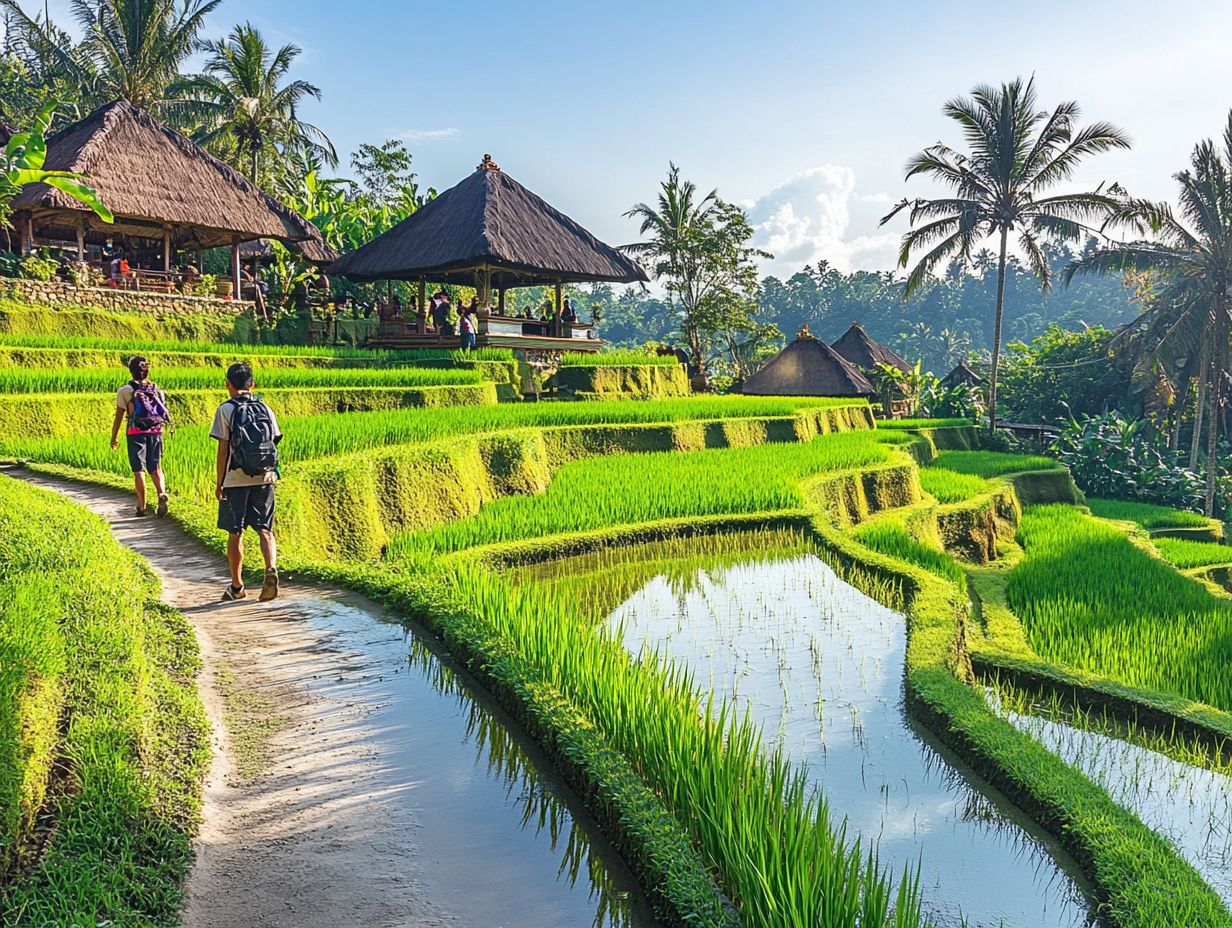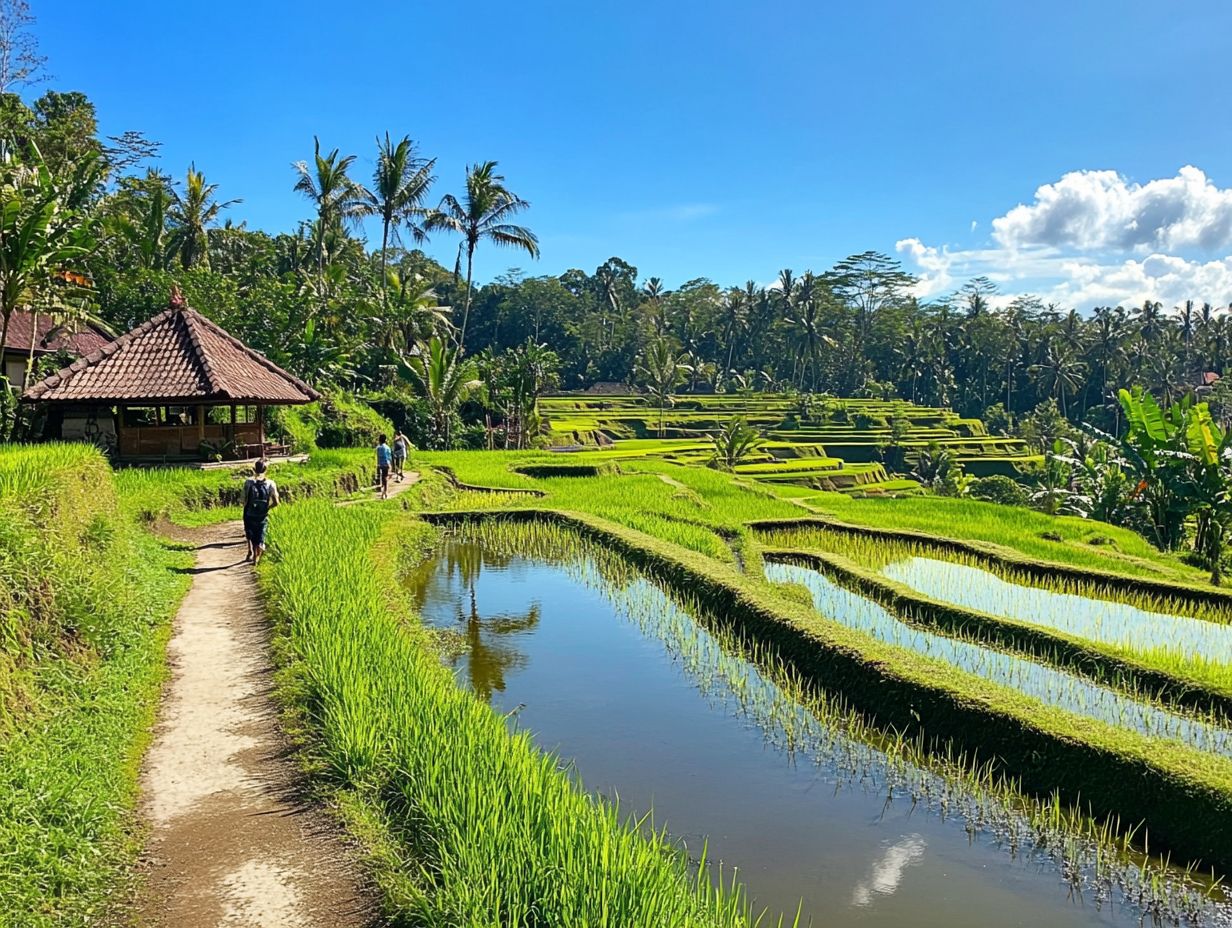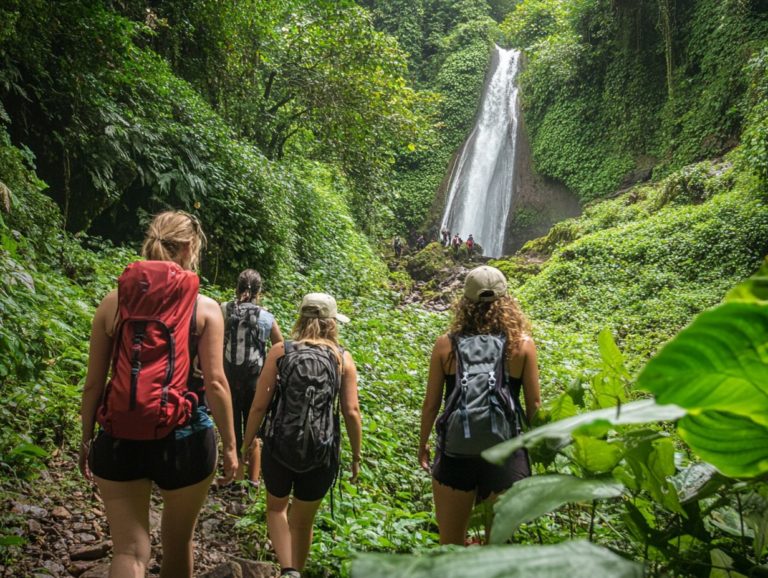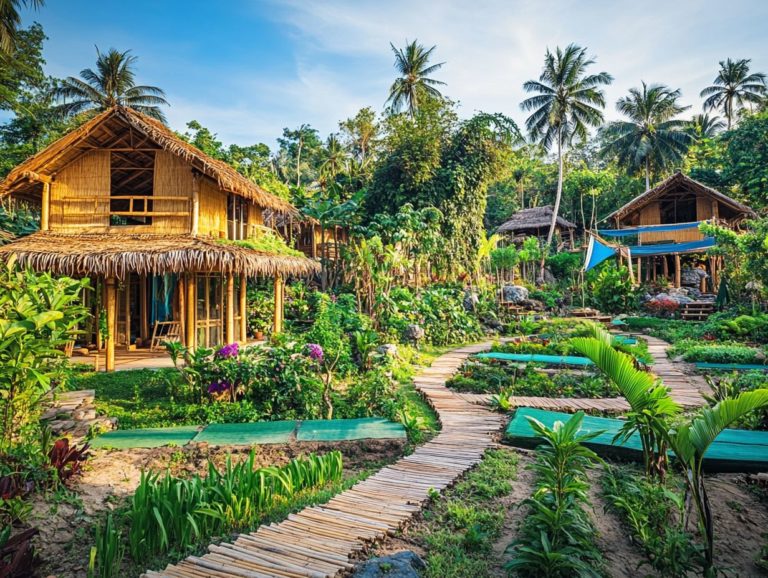5 Sustainable Travel Hotspots in Asia
Asia boasts some of the world s most awe-inspiring destinations. As you embark on your journey to explore these gems sustainably, it s crucial to know where to go and how to minimize your impact.
This guide highlights five sustainable travel hotspots Bali, Chiang Mai, Palawan, Kyoto, and Hoi An each offering unique experiences while prioritizing ecological and cultural preservation.
Dive into local sustainable initiatives, discover eco-friendly activities, and learn how to support communities, ensuring that your travels leave a positive mark on these beautiful regions.
Contents
- Key Takeaways:
- 1. Bali, Indonesia
- 2. Chiang Mai, Thailand
- 3. Palawan, Philippines
- 4. Kyoto, Japan
- 5. Hoi An, Vietnam
- What Is Sustainable Travel and Why Is It Important?
- How Can Travelers Reduce Their Environmental Impact in These Hotspots?
- What Are the Local Sustainable Initiatives in These Hotspots?
- What Are Some Sustainable Activities and Attractions in These Hotspots?
- What Are the Benefits of Choosing Sustainable Accommodations in These Hotspots?
- How Can Travelers Support the Local Communities in These Hotspots through Sustainable Travel?
- Frequently Asked Questions
- What are the top 5 sustainable travel hotspots in Asia?
- Why is Bali considered a sustainable travel hotspot?
- What makes Chiang Mai a sustainable destination?
- How is Siem Reap promoting sustainable tourism?
- What sustainable practices can be found in Hoi An?
- What sustainable initiatives can tourists participate in while visiting Kyoto?
Key Takeaways:

- Embrace sustainable travel by choosing environmentally friendly activities and accommodations in hotspots like Bali, Chiang Mai, Palawan, Kyoto, and Hoi An.
- Reduce your environmental impact by supporting local sustainable initiatives in these hotspots.
- Make a positive impact by supporting local communities through sustainable travel practices, such as volunteering and shopping locally.
1. Bali, Indonesia
Bali is an enchanting paradise that promises unforgettable experiences. As a premier destination for environmentally friendly travel, it seamlessly intertwines vibrant culture with stunning natural landscapes.
This alluring combination attracts millions of visitors each year, making it essential for you to prioritize wildlife preservation and the welfare of local communities.
You ll notice this commitment in the growing number of eco-friendly accommodations. These options not only minimize environmental impact but also invite you to experience unique stays, such as bamboo villas and organic farms.
Responsible tour operators enhance your journey by emphasizing low-impact adventures like hiking and cycling, guiding you through lush rice terraces and sacred temples, while fostering a deeper appreciation for local traditions. For those interested in eco-friendly options, consider these 7 tips for sustainable travel in Asia.
Engaging in these practices aids in the conservation of Bali’s stunning flora and fauna while providing invaluable support to local artisans and traditional farming methods. By choosing this path, you help ensure that the community flourishes economically while preserving its rich heritage.
2. Chiang Mai, Thailand
Chiang Mai invites you to an adventure tourism haven where you can immerse yourself in its rich cultural heritage while enjoying eco-adventure activities that support local artisans.
Picture yourself mountain biking along winding trails or trekking through lush jungles, as this remarkable region offers outdoor enthusiasts an array of exhilarating experiences. You might find yourself zip-lining across breathtaking landscapes or exploring enchanting waterfalls that seem straight out of a fairytale.
But it s not just about the thrill; connecting with local communities enriches your journey. Imagine participating in traditional cooking classes or engaging in handicraft workshops, where meaningful exchanges flourish.
By choosing responsible tour operators, you re not just embarking on an adventure; you re actively contributing to the preservation of the stunning backdrop while uplifting the very communities that make Chiang Mai truly unique.
3. Palawan, Philippines
Palawan is renowned for its stunning natural beauty and vibrant marine tourism. It s essential to engage in conservation initiatives that protect its unique ecosystems and support local communities.
The area’s breathtaking lagoons, colorful coral reefs, and diverse marine life draw travelers from around the world. As tourism continues to flourish, it s crucial to adopt environmentally responsible practices to ensure that this natural beauty and rich biodiversity are preserved for future generations.
Many local tour operators offer eco-friendly excursions that highlight sustainable practices, allowing you to explore enchanting underwater habitats while positively impacting communities that rely on these ecosystems.
By opting for responsible travel choices, you indulge in thrilling adventures while playing a vital role in maintaining the ecological balance that makes Palawan a true paradise.
Don’t miss out on this chance to explore the hidden treasures of Asia! Start planning your sustainable adventure today by checking out the most sustainable travel places in Asia and help protect the stunning beauty of these regions!
4. Kyoto, Japan

Kyoto, Japan, stands as a testament to history and culture, drawing in travelers who are deeply invested in heritage conservation and responsible tourism that honors its vibrant local traditions.
You ll be amazed by the iconic landmarks like Kinkaku-ji (the Golden Pavilion) and Fushimi Inari Taisha. Marvel at stunning architecture and immerse yourself in sacred practices that have withstood the test of time.
Immerse yourself in local arts like tea ceremonies and kaiseki dining. These experiences highlight Kyoto s strong dedication to tradition.
Engage in responsible practices to make a difference join guided tours that illuminate the community’s rich history or participate in workshops led by local artisans. Join workshops led by local artisans today and contribute to preserving Kyoto’s culture!
By supporting local businesses and honoring the customs cherished by residents, you play a crucial role in safeguarding Kyoto’s unique heritage and the vibrant culture of its people for future generations.
5. Hoi An, Vietnam
Hoi An, Vietnam, is a UNESCO World Heritage site, recognized for its cultural significance, that beckons with its vibrant culture and mouthwatering local cuisine. Here, sustainable practices are at the forefront, ensuring the well-being of both tourists and local communities.
In this enchanting town, you’ll discover a delightful blend of traditional methods and organic ingredients. Local farmers provide fresh produce to restaurants that prioritize sustainability, allowing you to savor dishes rich in flavors passed down through generations.
As a traveler in Hoi An, you have the opportunity to participate in cooking classes that not only teach authentic recipes but also emphasize the importance of using locally sourced ingredients. By supporting these establishments and embracing responsible tourism, you help preserve the environment and uplift the local economy.
Your culinary journey transforms into an enriching experience, fostering deeper connections with the local culture and its people.
What Is Sustainable Travel and Why Is It Important?
Sustainable travel represents a refined approach to tourism that emphasizes responsible practices. By prioritizing environmental protection and the welfare of local communities, you can ensure that every aspect of your journey contributes positively to the world around you.
This allows you to immerse yourself in rich histories and vibrant cultures while minimizing your carbon footprint.
Engaging in sustainable travel fosters a profound connection between you and the destinations you explore, nurturing mutual respect and understanding. By opting for sustainable choices, you support local economies and can stay informed about 5 sustainable travel trends to watch, playing a crucial role in preserving vital ecosystems.
Consider initiatives like eco-lodges, community-based tourism, and wildlife conservation programs, which demonstrate how sustainable practices yield lasting benefits. Take, for example, Costa Rica, where eco-tourism has significantly enhanced conservation efforts while providing meaningful employment for locals. Similarly, in Thailand, community-led programs empower residents and safeguard indigenous cultures, setting a high standard for modern tourism. For those looking for unique experiences, exploring the best eco-friendly tours in Southeast Asia can be a rewarding option.
How Can Travelers Reduce Their Environmental Impact in These Hotspots?
You can significantly reduce your environmental impact when visiting popular hotspots by embracing environmentally friendly practices. Consider using public transport, minimizing waste, and supporting green travel initiatives that promote sustainable tourism.
Selecting responsible tour operators elevates your travel experience while ensuring that local ecosystems are respected. These operators typically employ sustainable practices that support local economies and protect natural resources.
Choosing eco-friendly accommodations, such as lodges that use renewable energy or have waste-reduction programs, lowers your carbon footprint and provides a unique chance to engage with the local culture.
Make conscious choices to enjoy your adventures. By following 5 tips for responsible travel in Asia, you’ll also help preserve the beautiful destinations you explore and their rich ecosystems.
What Are the Local Sustainable Initiatives in These Hotspots?

Many hotspots around the globe embrace local sustainable initiatives designed to foster conservation, benefit communities, and promote eco-friendly practices that support locals and protect the environment.
These initiatives nurture a deeper connection between residents and their surroundings. They also offer you authentic experiences that highlight cultural richness while supporting ecological balance. For example, in Costa Rica, community-led reforestation projects invite you to roll up your sleeves and plant trees, contributing to wildlife habitats and enhancing biodiversity. Beach clean-up campaigns in the Maldives encourage you to join locals in preserving delicate marine ecosystems.
By getting involved in such initiatives, you can actively make a positive impact while enriching your own adventures.
What Are Some Sustainable Activities and Attractions in These Hotspots?
In these vibrant hotspots, immerse yourself in sustainable activities and attractions that promise unforgettable travel experiences and play a vital role in wildlife preservation and the celebration of local culture and heritage.
Take guided eco-tours through lush rainforests, exploring diverse flora and fauna while learning from local experts about their conservation efforts. Picture yourself kayaking through mangroves, gaining a unique view of aquatic ecosystems that underline the importance of safeguarding these essential habitats.
Participating in community-led workshops like traditional crafts or farm-to-table cooking classes cultivates a deeper appreciation for local customs and supports residents economically.
These eco-adventures enhance your travel experience and inspire you to embrace sustainable practices, ultimately creating a positive impact on both the environment and the communities you visit.
What Are the Benefits of Choosing Sustainable Accommodations in These Hotspots?
Choosing sustainable accommodations brings many benefits. You support conservation and enjoy a more eco-friendly travel experience.
By opting for these eco-conscious options, you actively contribute to preserving natural resources while deepening your connection with local cultures. Staying in top eco-friendly hotels in Asia allows you to generate income for local communities, enabling them to uphold their traditions and sustain their livelihoods.
These choices often champion responsible tourism practices, such as minimizing waste and reducing carbon footprints. For inspiration, consider exploring 5 unique sustainable destinations. Doing so elevates the quality of your travel experience and leaves a positive mark on the planet.
How Can Travelers Support the Local Communities in These Hotspots through Sustainable Travel?
You have the opportunity to actively support local communities in these vibrant hotspots through sustainable travel practices that encourage getting involved with the community, respect for cultural traditions, and the promotion of local artisans and businesses.
Engaging with local guides gives you valuable insights into the region’s history and traditions, enriching your experience in ways you never imagined.
Dive into cultural events for an unforgettable experience! You ll immerse yourself in authentic customs while directly contributing to the community s economy.
Purchasing handcrafted products from local artisans not only ensures they receive a fair wage, but also helps preserve their traditional crafts.
Your support helps create a thriving local economy and enables residents to maintain their cultural heritage. In this way, both you and the communities benefit from a truly enriching exchange.

Frequently Asked Questions

What are the top 5 sustainable travel hotspots in Asia?
- Bali, Indonesia
- Chiang Mai, Thailand
- Siem Reap, Cambodia
- Hoi An, Vietnam
- Kyoto, Japan
Why is Bali considered a sustainable travel hotspot?
Bali is considered a sustainable travel hotspot because of its strong commitment to sustainable practices, such as eco-friendly accommodations, organic farming, and conservation efforts.
What makes Chiang Mai a sustainable destination?
Chiang Mai is a sustainable destination due to its focus on community-based tourism, support of local artisans and businesses, and various eco-friendly activities like elephant sanctuaries and hiking tours.
How is Siem Reap promoting sustainable tourism?
Siem Reap is promoting sustainable tourism through initiatives like responsible temple tourism, waste management programs, and supporting local NGOs that work towards environmental conservation and community development.
What sustainable practices can be found in Hoi An?
Hoi An has a strong emphasis on preserving its cultural heritage and promoting sustainable tourism through initiatives such as banning single-use plastic, promoting bicycle tours, and implementing eco-friendly practices in businesses.
What sustainable initiatives can tourists participate in while visiting Kyoto?
While in Kyoto, tourists can participate in various sustainable initiatives such as staying in traditional guesthouses, eating at local restaurants that support sustainable fishing and farming practices, and visiting eco-friendly attractions like the Adashino Nenbutsu-ji Temple.






